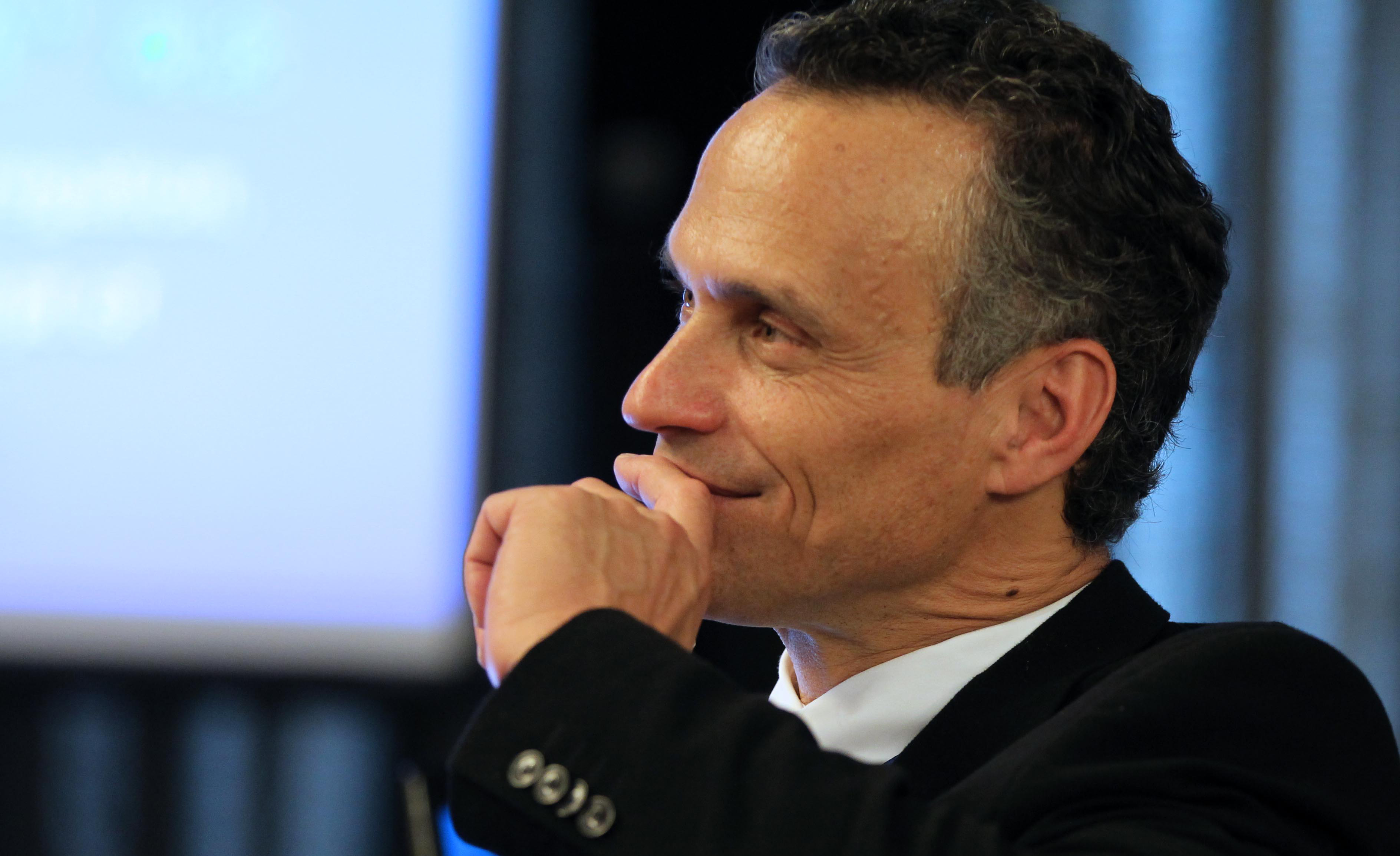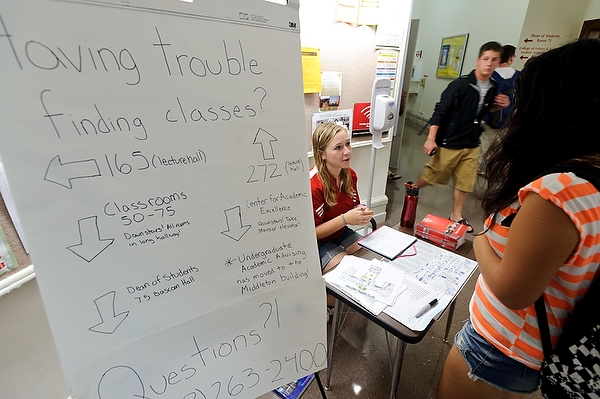Finding the right college isn’t a quest for the ‘best’

Michael Roth, president of Wesleyan University and author of Beyond the University: Why Liberal Education Matters

A student asks for help at the registration desk on her first day of class at the University of Wisconsin-Madison. As Michael Roth said, the “best” college should help students find out who they are as well as discover how the world works. Each school’s student culture is more important than university rankings by media, Roth said.
In April, thousands of US colleges hosted tours for prospective students preparing to take the next step in their educational journey. Choosing the right college is an important decision that depends on each individual’s ambition, passion and motivation, with rankings often used as a metric of the “best” college.
However, the “best” college isn’t necessarily a prestigious Ivy League school or at the top-ranked university, said Michael Roth, president of private Connecticut liberal arts college Wesleyan University.
Roth, who is also the author of Beyond the University: Why Liberal Education Matters, argues that many schools offer the “best fit” for students based on their needs.
Shortcomings with rankings
Addressing the college application process, Roth echoed the views of journalist Frank Bruni in his book Where You Go Is Not Who You’ll Be: An Antidote to the College Admissions Mania. Bruni criticized the college rankings systems, in particular those compiled by the U.S. News & World Report. In ranking the most selective colleges highest, Bruni argues that this leads schools to spend more money on recruiting students to apply only to reject them.
In an April opinion article titled “You didn’t get into Harvard, so what?” in the Washington Post, Roth wrote about what he called a “dismal learning trajectory.”
“Many talented high school students in this country receive exactly the opposite message.”
“They are told to pack their résumés with activities that will impress admissions counselors; they are coached not to make any mistakes that might blemish their records; they are tutored and tutored and tutored so as to have every competitive advantage on high-stakes tests that are ‘standardized’ in name only,” he wrote.
He continues: “The point of high school is to get into the college that rejects the highest percentage of its applicants; the point of college is to gain access to employers or graduate programs that turn away the greatest number of qualified candidates; the point of life is to have more of the stuff that other people are unable to acquire. What a sorry, soul-killing lesson this is: to value things only to the extent that other people are deprived of them.”
Economics, size, location
Roth, whose daughter is a high school senior, said the common belief among her peers is that the best colleges are those that are most selective. “Calming her anxiety, her mother and I kept reinforcing the notion that there are many great schools out there right for her,” he wrote.
For many students, cost can be a strong factor in the college application process. Size and location are also important considerations. A large university in an urban setting can be very popular, along with the city itself, if it can offer rich internship opportunities and cultural diversity.
Liberal art schools can be more attractive to some students seeking personal mentorship. Roth noted some colleges, including Columbia University and the University of Chicago, have tried true core curricula that each student is required to take. Other colleges, including Amherst and Wesleyan, have only guidelines and advisers but no required courses.
However, there are other important considerations for students preparing for college, with Roth arguing the “personalities” of each school require attention.
In an April 2012 blog entry titled “Now that you’ve been accepted: how to choose your university” written for the Huffington Post, Roth wrote: “Visiting students are trying to imagine themselves on the campus … to get a feel for the chemistry of each place; they are making their best guesses as to whether they will be happy in a particular context.”
When touring various schools, Roth said students must try to assess whether they would fit in, be happy and have strong employment prospects after graduation. Alumni considerations can also tip the balance in favor of one school over another.
Preparing to thrive
Above all, Roth said many students ask themselves one key question: “Will I be more likely to get a good job if I attend this school?”
Addressing this point, Roth said a student’s undergraduate studies should prepare them for more than just their first job. “Sure, one should leave college with the ability to compete for gainful employment,” Roth wrote in a blog entry for the Huffington Post titled “In college, choose to thrive” in April 2014. However, there is more to the college experience than just gaining a degree, he added.
“Your college education should prepare you to thrive by creating habits of mind and spirit that will contribute to development far beyond one’s university years. Thriving means realizing your capabilities, and a liberal education should enable you to discover capabilities you didn’t even know you had while deepening those that provide you with meaning and direction,” he wrote.
Roth said one should get the most out of college by “aiming to find out who they are and what kind of work they will find most meaningful.”
Finally, Roth emphasized the importance of each school’s student culture when choosing the right college. In an article titled “Beyond prestige and comfort: The right way to choose college” for the Washington Post, Roth wrote: “It’s the evolution of student culture over many years that comes to define the way a place feels to the young men and women who spend these transitional years on campus. Students—not teachers and officials—make that culture.”
College is about “finding out so much more about yourself as you also discover how the world works, how to make meaning from it and how you might contribute to it,” he added.
Biography of Michael Roth
Michael Roth became the 16th president of Wesleyan University on July 1, 2007. A professor in history and the humanities since 1983, Roth was the founding director of the Scripps College Humanities Institute in Claremont, California, a center for intellectual exchange across disciplines. He developed a reputation as a leader in the arts community through his accomplishments as associate director of the Getty Research Institute in Los Angeles and his success as president of the California College of the Arts in enhancing that institution’s academic quality, national reputation and financial strength.
He has authored six books, including Psycho-Analysis as History: Negation and Freedom in Freud, Knowing and History: Appropriations of Hegel in Twentieth Century France, Beyond the University: Why Liberal Education Matters and three other books and edited and co-edited numerous journal issues and books. Roth’s Beyond the University has been a powerful tool for students, their families, faculty and policymakers who are wrestling with the future of higher education in America. The book has been assigned to prospective students and to boards of trustees, and Roth has continued to amplify its message in public speaking engagements across the country and in major media outlets. His call for a “pragmatic liberal education” is the cornerstone of his scholarship and his administrative work at Wesleyan.

 PRINT
PRINT CLOSE
CLOSE